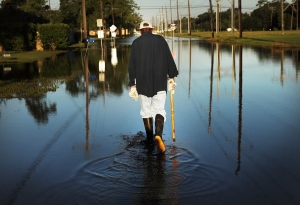9-12-18-ERNIE ALLEN’S-TOP STORY-
As communities along the Southeast coast brace for Hurricane Florence, African-American residents are likely to bear the brunt of the monstrous storm.
Evacuations were underway on Monday in the Carolinas as the hurricane reached sustained winds of nearly 130 mph and were expected to reach 150 mph over the next 36 hours, NPR reported.
The National Hurricane Center predicted that Florence will deliver “life-threatening impacts” to a large swath of the East coast later this week.
Despite the warnings and past storms, including hurricanes Harvey and Maria in 2017, the nation is not ready because the U.S. lacks a “culture of preparedness,” FEMA Administrator Bock Long told USA Today.
A disproportionate number of African-Americans generally live in low-income neighborhoods or buildings that are susceptible to storm shocks, according to the Brookings Institution, a nonprofit public policy think tank. The substandard infrastructure of affordable housing units is at greater risk of crumbling under the pressure of hurricane winds.
People living in those vulnerable communities tend to not have the resources to relocate to safer locations. If they are able to get away, they usually struggle to replace storm-damaged property because they typically lack flood insurance policies.
Long after cities clean up following hurricanes, Black folks often find themselves at the end of the line for receiving government assistance. Three months after Harvey, Black residents were being left behind in getting the help they need, according to a study by the Kaiser Family Foundation and Episcopal Health Foundation.
In applying for FEMA assistance, 34 percent of white residents had their applications approved, compared to 13 percent of Blacks. A disproportionate number of Black people also struggled to find housing and purchase necessities like food for months after the storm was over.
Nigel Roberts









